Why is my EKG still bad and what is a negative T-wave? Why can't TWO doctors decide on my prescription drugs? Why aren't my surgical wounds handily healed and ready for moving on?
A pic of my new Delaware driver’s license to go with my new heart.
Pic of the Day
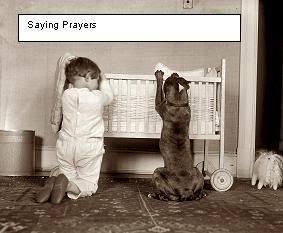
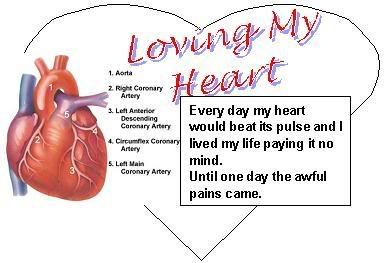
The First Post-Op EKG and Other Post Quadruple Coronary Bypass Concerns
It was a hallmark day. I'd made the appointment with the Cardiologist just a few days after my quadruple bypass operation. The appointment was a full six weeks away at that time and as I noted the date, I considered it as a time in the distant future. Surely come the time for the scheduled visit I'd be well beyond the surgery. I did understand the necessity of keeping up a regular visit to the various medical specialists. Indeed I'd made an appointment a full year in the future at my two week follow-up with the cardiac surgeon.
I would be a good patient and go to the cardiologist. After that appointment I was sure I'd not seen him again save perhaps in a year for a routine check up on the heart that it still worked as it should.
The Delaware Motor Vehicle Administration had, around the time of my scheduled Cardio visit, asked that I please come in for a new driver's license, requiring an eye test and an updated photo. I decided to go first to the DMV for my new photo then head down to the Cardiologist.
I had, after a month of walking around with damn near my entire chest exposed for the rubbing fabric that so irritated, considered that since I would be going back to the Cardiologist for the first time since the near-death stress test, and since I would be photographed for a driver's license that I would have to carry around for five years, I decided to look nice.
I was quite surprised at how well my driver's license pic turned out that I tried to take a picture of it. Below, the blurry result.
With my fine MVA pic, it was time to head to the cardio doc.
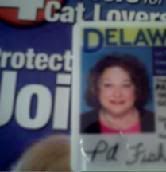
"You see," the Cardiologist told me, pointing to some lines on my EKG. "Here's a negative T-Wave." The Cardio doc circled this "negative T-wave" with a flourish.
Of course I was a bit disappointed. But then I didn't know if EKG's ever come out "right" after cardiac surgery. In fact, the Cardio doc shrugged and said it was probably part of the healing process.
At the end of July I will have another EKG and for now, the doc didn't seem all that worried so I shall bide my time.
Then came time for a discussion of the prescriptions.
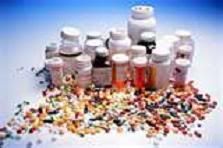
For ladies and gems, prescription medicine is a way of life for post-surgical type folks and I suppose for most older Americans, of which I am now one, the other, or both.
Before this surgery I'm betting I'd had perhaps, I don't know, maybe ten prescriptions in my entire life. This includes such as antibiotics, an allergy medicine I once took and the various birth control pills I took when I was young and trying to control my births.
After I'd come home from the hospital following surgery I had a fistful of prescriptions to fill. I was shocked speechless by the cost of prescription medicine!
And this with a couple of the prescriptions coming in at $4.00 thanks to Wal-Mart, that horrible retailer the liberals love to hate.
Even though I had a prescription card with our health care insurance, the total was over a hundred bucks when all the pills were bottled and presented.
"Did you use my health card?" I asked the Wal-Mart drug clerk. Surely, I mean SURELY, she didn't use my prescription card and that hundred bucks was the cost of my medication BEFORE the card?
"Yes I did," the Wal-Mart drug clerk assured me. "It's the Plavix that's so expensive."
When I got home I made an inventory of every damn pill the medicos wanted me to take, the times, what for, the number of refills and any other notes I wanted to make.
For if we do not take control over our own health needs than who?
I was taking pills to help me release fluid, pills for pain, that expensive Plavix, Lipitor, something else for cholesterol, a couple of pills for diabetes, pills for this and pills for that.
A few of my prescriptions were non-refillable so I figured that after done the pills in the Rx with no refills than I was done with them. The Darvocet, for the pain, was not refillable. Many of the pills, evidently, were meant to aid me in post-operative recovery and this gave me comfort. Fully three of these post-operative prescriptions came in at the infamous Wal-Mart $4.00 and that was just great. The liberals want to kill Wal-Mart; Wal-Mart is the enemy. Of course it's the UNIONS that want to kill Wal-Mart and as of this date, no unionized company has offered a wide assortment of prescriptions for $4.00 per month, I would note.
The Plavix did, indeed, cost $60.00 for a one month supply.
Wow. I have no idea what the Plavix cost without my prescription plan. $60.00 a month was certainly do-able in terms of my budget but I wanted answers.
So I asked the Cardio doc if I really needed this Plavix.
There then followed a round-robin of phone calls involving the cardiac surgeon, the cardiologist, an assistant of the cardiac surgeon and someone else I’m not sure who she was. For the cardiologist instructed me to call the cardiac surgeon, that he (the cardiologist) thought that Plavix was a drug normally prescribed for only a month after cardiac surgery, an insurance against such as plaque running around loose in the blood stream after the upset of the invasive surgery. Plavix, as I’ve learned, is the latest and greatest in prescription drugs that effectively coats nasty plaque with a coating that makes the plaque particles too slippery to allow them to stick together and form a deadly clot.
One cardio doc told me, through appropriate surrogates, that I should be not be asking HIM. Then one of the cardio guys actually called me and told me to hold on, that an answer was coming.
With my mind reeling, I decided to check out my Plavix prescription bottle and I discovered that there was no refills for the drug unless refilled BEFORE 5/8/08. That date is significant in that this was the day AFTER I was discharged from the hospital AFTER my bypass.
It’s still confusing to me but do I not have the excuse of inexperience here? Because evidently the Plavix prescription was meant to be filled one time (the day of my release from the hospital) although I’m not at all clear on that date matter. I do know that were I take to the Plavix to the druggist for a refill I would not have been able to do so. Thus the answer is right on the pill bottle.
The medicos involved in all this, on the other hand, seemed quite confused although the issue was no big deal, mind you. The prescription was evidently written in a manner to prevent me from an inadvertent refill and both doctors’ offices and their people went to great lengths to help me resolve the matter.
I finally made all parties involved understand that I was the one who was confused but hey, my point being here, I AM THE PATIENT!
Couple of points here: First, patients have to pay attention to their own medical care, including monitoring drugs given for ingestion in their own personal bodies. It would be wrong to willy-nilly assume that pills given out by medical professionals are always right, the amount is correct, the medicine itself always appropriate. And if confused, make them explain it!
Which brings me to my stunning conclusion that thank God Barack Obama will soon be our President. He will put the government in charge of all medical care and we will have to deal with our prescription concerns with some union-controlled government bureaucrat and things will be much better.
Heh.
Finally, wounds.
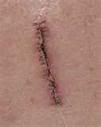
I have three major wounds from my surgery although there are nicks and stabs all over my body. At this point however most of the smaller wounds have healed. In all honesty, the three major wounds have healed very well but go with me on this, I still know they’re there and material rubbing against my chest wound still feels like a manhole cover slams down against it with any movement.
I was very surprised, a bit disheartened frankly, that it took so long for these surgical wounds to heal. Six weeks now and still they hurt.
If I had one suggestion to those advising cardiac bypass patients, tell them that those wounds are going to take a while to heal, that the body was greatly assaulted during the bypass surgery, ribs were spread wide, hearts might have been all about the chest, sutures were made around veins and directly into the heart. It’s comparable to being a victim of a crime during which one is stabbed in the chest repeatedly. The criminal just wasn’t as careful about infection and location of the wounds as the surgeon but it’s an assault to the body and the body now has a lot of healing to do, inside and out.
This knowledge won’t make the wounds heal quicker but it might keep a restless patient from undue worry as to why the pain continues on.
NEXT…a new life after cardiac bypass surgery; reviewing the past and revising the anticipated future.
ALL LOVING MY HEART POSTS HERE

3 comments:
I came upon your blog from a list compiled by Hube, and enjoyed your HMO description greatly. Very amusing.
I have had two angioplasties and have a couple of stents.
The cardiologist insists I take Plavix, ostensibly for the rest of my life, even though it makes me get unsightly scabs over all over my arms.
It doesn't much matter to me what it costs, since I have a prescription plan from my former employer. It costs me $10 for a three months' supply. I'm just grateful that I'm still here.
I just stopped by to say hello and wish you a speedy recovery.
BTW: I believe there is a generic for Plavix. This might ease the pain--in the wallet.
I pray for your fast recovery. I haven't really undergone any surgery but I've heard a lot of stories saying how difficult it is to cope up and recover. So, just visit your cardiologist for a check up as scheduled and have faith in Him. Pray and Trust that God will guide your doctors to help you recover fast and maintain good health.
Post a Comment